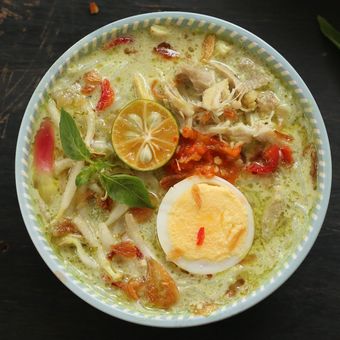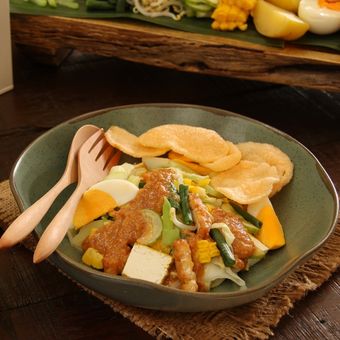Soy sauce, another Chinese ingredient, also eventually became a staple in Betawi food. As did peanuts, which were brought to old Jakarta by Chinese immigrants in 1755.
Indonesian cuisine is “no longer Chinese food or Indian food or Javanese food, it’s about togetherness,” Malagina explains.
Laksa Betawi, a cultural heritage
 An illustration of Laksa Betawi
An illustration of Laksa BetawiIndonesian food consultant Heni Pridia says dietary acculturation is particularly noticeable in the ingredients of Betawi dishes. Laksa Betawi, for example, is a coconut milk-based dish combined with noodles — a staple in Chinese cuisine.
“Since coconut milk and some local spices were easily available, they [the Chinese] tried to combine it with their own comfort and familiar food such as noodles,” Pridia told DW. “As time went by, locals remade the dish and called it laksa Betawi.”
Fadly Rahman, a historian, and lecturer from Padjajaran University in West Java Province says an ancient inscription found in the city with the words hang laksa — meaning “people who sell laksa” — can be traced back to the 15th century.
Back then, many Chinese immigrants sold the coconut noodle dish to earn a living in their new home city, Rahman explained.
Laksa Betawi undoubtedly became one of the most popular dishes in old Jakarta society, he told DW, citing cookbooks from Indonesia’s colonial era.
Not much has changed since then, it seems. The Jakarta government has listed some 20 beloved Betawi dishes as part of its cultural heritage — among them laksa Betawi.
Other cherished dishes selected to reflect the city’s multicultural identity include pecak mujair (a deep-fried fish served with aromatic sauce) and sayur besan (noodles in coconut milk soup with sugarcane blossom).
Preserving Betawi cuisine
 An illustration of gado-gado, the betawi version of salad with peanut sauce and crackers.
An illustration of gado-gado, the betawi version of salad with peanut sauce and crackers. It’s not so easy to find Betawi cuisine in the capital these days. Complex recipes, long cooking hours, and rare ingredients mean dishes like sayur besan are slowly fading away and replaced with fast foods and street food.
But there are still a few Betawi family-run eateries remaining in Jakarta. One of them is Suhaer Be’eng, owner of a small Betawi restaurant in Depok, southern Jakarta.
“Most dishes in the restaurant are inherited from our grandparents,” Yusri Khoiriyah, Be’eng’s daughter, told DW.
Every day, Khoiriyah starts her day just before dawn to prepare a number of Betawi dishes.
One of her family specialties includes sayur besan, a dish originally reserved for Betawi weddings and engagement parties. Sugarcane blossom, one of its key ingredients, is becoming increasingly expensive and hard to find.
Ahmad Syihabbudin, the owner of the Laksa Betawi Asirot restaurant in south Jakarta, says he still uses his grandmother’s recipe from 1972.





























